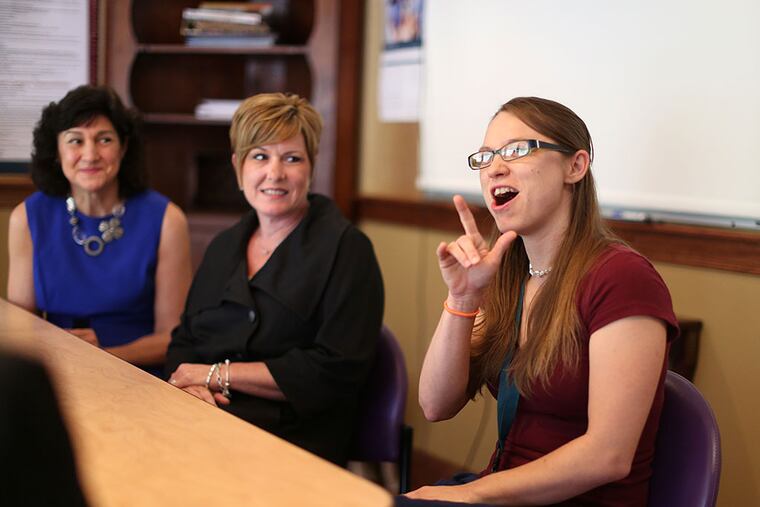Program gives deaf caregivers new opportunities
Corporate mergers often mean layoffs, as new bosses redefine standards. But when Valley View at Elwyn, an assisted-living home for deaf residents, joined the Mercy Health System, something very different happened.

Corporate mergers often mean layoffs, as new bosses redefine standards.
But when Valley View at Elwyn, an assisted-living home for deaf residents, joined the Mercy Health System, something very different happened.
Valley View's 13 direct-care providers are deaf and use American Sign Language with their patients, some of whom have lived there for 30 years. But Mercy LIFE (Living Independently for Elders) requires staff to be registered nurse aides, and Valley View's staff lacked that qualification.
This was no small problem. For instance, the certification test requires applicants to be able to listen to heart sounds through a stethoscope.
Rather than starting over with a staff that might be state-certified but couldn't communicate with patients, Mercy LIFE decided to take another route.
With Delaware County Community College, the 13 clinical staffers will be able to keep working at the home, now called Mercy LIFE Valley View, while getting training and certification they thought they would never be able to achieve.
In return, their employers get caregivers who have developed deep connections with the residents of Valley View, who have been deaf for all or most of their lives and use ASL.
"We hired all of the existing staff that had been taking care of these folks for many, many years," said Molly Crumley, director of operations for Mercy LIFE. "But the existing staff didn't have the tools they needed to be successful in their jobs."
Among the staffers who will be getting those tools is Colleen Jordan, 31. She started volunteering at Valley View after finishing high school 10 years ago, and loved it so much she never left.
"I felt like it was a great match for me," Jordan signed through an interpreter. "I didn't even realize that I had a hidden talent with the residents here."
One resident, Robert Hankinson, 85, needed no interpreter to converse with her as she sat down beside him and asked him how his day was going.
Through a partnership between Mercy LIFE and DCCC, and a Healthy Aging grant from United Way of Greater Philadelphia and South Jersey, the "Excellence in Care" nursing assistant program will allow four students at a time to take coursework and complete clinical rotations at the college.
Students completing this course are qualified to test with the American Red Cross and, if successful, will be placed on the Pennsylvania Nurse Aide Registry. Mercy LIFE's goal is to keep the program going to train even more deaf students than those who are now working at Valley View. Anna Marshalik, Mercy LIFE's director of education, said she could find no other program like it in the country.
It fell to Beatrice Agar, nurse aide program coordinator at DCCC, to find an answer to her first question: "Would it even be possible for a deaf person to become a nurse aide in Pennsylvania?"
One of the required skills for certification is to obtain blood pressure, and to do that the person would need be able to hear sounds through a stethoscope.
"There wasn't an alternative to that" for the exam, Agar said. "But the state Department of Education is collaborating with us to make accommodations."
The Department of Education is allowing the students of this program to learn to take blood pressure using an electronic cuff. They won't be tested on that skill for the registry exam, but will be examined on a random selection of 21 other skills that are mandatory for certification.
The creators of the program have overcome other logistical barriers, such as working out clinical rotations in smaller groups so that interpreters provided by the college can accompany the students when they are working with people who do not use ASL. The college also is scheduling class times so the students can continue their work at Valley View.
"This is an opportunity that is not always at their fingertips," Crumley said. "DCCC and Mercy LIFE are providing them this opportunity. We hope it makes them feel like they can achieve anything."
"I'm very, very excited," Jordan said of her upcoming adventure. "And I'm ready."
215-854-5502
@JungleQueen18